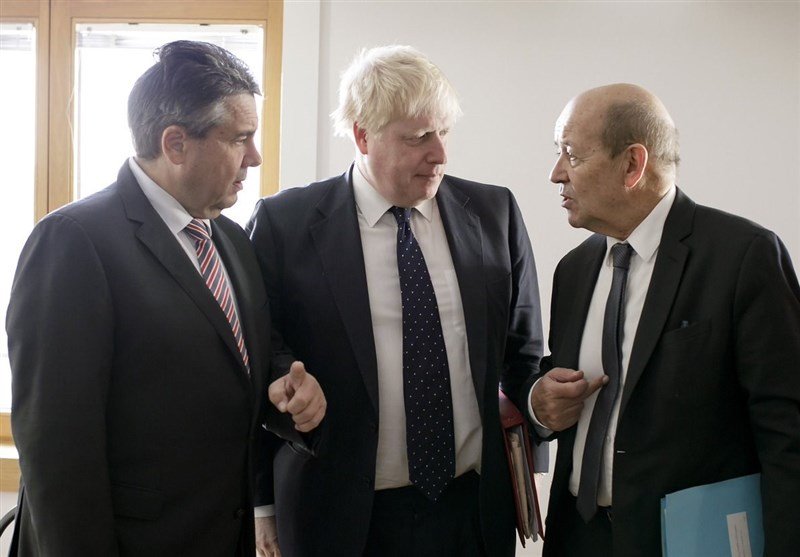U.S. and the European Troika's new approach against Iran

TEHRAN - "Regional negotiations with Iran," is one of the common interests of the United States and the European Union in post-JCPOA period. Meanwhile, France is about to play the role of a "pioneer".
Reuters has recently claimed that European countries have begun negotiations with Iran over this country's regional role, intending to remove Trump's concerns regarding the Joint Comprehensive Plan of Action (JCPOA).
According to Reuters, the talks began on the sidelines of the Munich Security Conference with the focus on Yemen and the related issues in the region and it is supposed to continue in the future. Reuters wrote: "European powers and Iran have started talks over Tehran’s role in the Middle East and will meet again this month in Italy as part of efforts to prove to U.S. President Donald Trump that they are meeting his concerns over the 2015 nuclear deal…. (And) they are due to meet again in Italy this month,"
The report continued: "With Trump warning of a last chance for “the worst deal ever negotiated”, Britain, France and Germany have been working with U.S. officials to draw up a strategy to improve the Iran nuclear deal in return for Trump keeping the pact alive by renewing U.S. sanctions relief on May 12."
The point that needs to be taken into consideration in the Reuters report is that the regional negotiations between Iran and European countries is planned to take place in different stages. According to this news agency, the first round of talks on Yemen conflict has been held on the sidelines of the Munich Security Conference last month, and Europeans are hoping to talk about the role of pro-Iranian groups in Lebanon and Syria in the next round of talks.
In this regard, we should carefully pay attention to some important points in these negotiations: Firstly, "regional talks with Iran" are one of the common interests of the United States and the European Union in post-JCPOA time. At the time of signing the nuclear deal between Iran and members of P5+1 about two and a half years ago, many analysts of international affairs agreed that Washington and the European Troika would be willing to use JCPOA as an entry point for regional negotiations with Iran.
The efforts of the three countries of Germany, Britain and France to negotiate region's affairs with Iran are also to be analyzed in the same vein. Meanwhile, France is about to play the role of a "pioneer" in these negotiations. "Jean-Yves Le Drian", the French Foreign Minister's visit to Tehran (which will take place shortly) is also planned for the same purpose. Paris has promised Washington to do its utmost to negotiate with Iran over the regional policies of our country. In this way, Germany and Britain are also accompanying France.
The second point here is about the significant talks held between US President Donald Trump and senior European officials on Iran's regional policy and its relevance to the JCPOA during the United Nations General Assembly in New York. In these talks, French President "Emanuel Macron" promised the President of the United States to lead and manage the missile and regional negotiations with Iran.
This is despite the fact that a number of Iranian policies are fixed and are not to change under any circumstances. Some issues, including the foreign policy of the Islamic Republic of Iran, our country's support for the resistance groups, and most importantly, Iran's strong confrontation against the regional threats of the United States and its allies will be unchangeable no matter what happens in other domains.
The same issue causes the European authorities not to see a positive perspective for their interfering strategies. However, European officials has mentioned that the inception of regional talks with Iran (though unofficially) could be a starting point for "limiting Iran's regional."
The third point is that the insistence and reliance of our country's diplomacy apparatus and foreign policy on our unchangeable regional strategies, including "supporting resistance groups", "promoting resistance discourse" and "counteracting Takfiri Terrorism", play an important role in neutralizing the tricks of the United States and the European Union.
It should not be forgotten that the European Troika is managing the talks on behalf of the United States, and in full coordination with Donald Trump. What will dominate our diplomacy system over the joint game of Washington, Paris, London and Berlin, is our politicians being determined in defending our strategic principles in the region. Obviously, in the shadow of this "decisiveness and clever defense," the United States and the European Troika are not going to achieve any of their goals in limiting the regional maneuverability of Iran.
The last point is that the United States and the EU are using a leverage called "the JCPOA" to lead regional negotiations with Iran, and press our country to address U.S. regional demands. In other words, the JCPOA, instead of remaining as an independent legal document, has become a political tool to exert pressure on Iran. Here again, the diplomacy apparatus and foreign policy of our country should be very smart.
Meanwhile, we should be extremely careful not to cross the red line of our foreign policy which is "preserving the regional authority of Iran" rather than "preserving the JCPOA." Obviously, no one can bargain on our strategic principles in the region and this should be exactly understood as a definite proposition by the opposite side (Washington and the European Troika).
